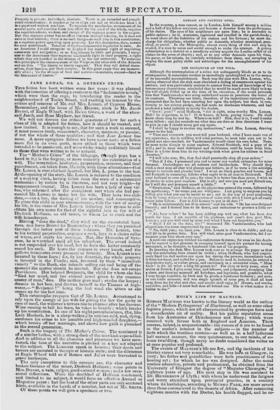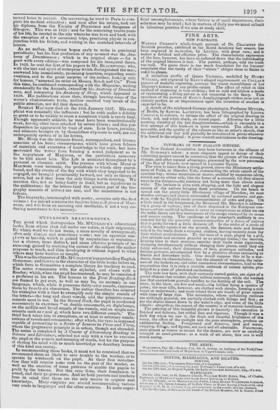MOIR'S LIFH OF MACNISH.
ROBERT MACNISH was known to the literary world as the author of the" Modern Pythagorean" of Blackwood, as well as some other fugitive pieces, which are all characterized by grotesque force and a considerable air of reality. But his public reputation arose from his Anatomies of Drunkenness and Sleep ; which were received with favour both in England and America. Their success, indeed, is unquestionable: the causes of it are to be found in the reader's interest in the subjects—in the number of facts which the treatises contain—as well as in a half ludicrous half earnest manner, the very quintessence, to our minds, of so- lemn twaddling, though many no doubt considered the writer as at once popular and profound. The events of MACNISH 'S life are few, and the incidents of his literary career not very remarkable. He was bofn at Glasgow, in 1802 ; his father and grandfather were both practitioners of the healing art ; for which he too was designed. After the usual routine education, private and professional, he obtained from the University of Glasgow the degree of "Magister Chirurgise," at eighteen years of age. His next step in life was assistant to Dr. HE,IDERSON of Clyth ; with whom he underwent the fatigues and worry attendant upon provincial practice, in a country where its hardships, according to MUNGO PARR, are more severe than those encountered in the deserts of Africa. After remaining eighteen months with the Doctor, his health flagged, and ho re-
turned home to recruit. On recovering, he went to Paris to com- plete his medical education ; and soon after his return, took out
his diploma from the Faculty of Physicians and Surgeons of Glasgow. This was in 1825 ; and for the remaining twelve years of his life, he resided in the city where he was born and bred, with the exception of a few occasional trips, practising physic in con- junction with his father, and writing in the snatched intervals of leisure.
As an author, MACNISH began early to write in provincial periodicals; but his first production of any moment was the Ana- tomy of Drunkenness ; which in its original shape — for it grew with every edition—was composed for his inaugural thesis. In 1826, he sent the first of his papers to Mr. BLACKWOOD; who, with the tact and spirit of enterprise which distinguished the man, answered him immediately, promising insertion, requesting conti- nuations, and to the great surprise of the author, looking only for honour, "annexed an order on Messrs. Brash and Co." From this time, he continued corresponding with the Magazine, writing occasionally for the Annuals, extendirm his Anatomy qf Drunken- ness, and composing his Anatomy of Sleep, which appeared in 1830. His publications since then, though bearing some of the writer's characteristic traits, neither received very much of the public attention, nor did they deserve it. ROBERT MACNISH died on the 16th January 1837. His com- plaint was nominally the influenza ; but he sank under a debility so great as to be unable to resist a complaint which is rarely fatal. Though apparently athletic, he must have been constitutionally weak, having often been attacked by severe illness ; and this pre- disposition he aggravated by want of care. Late hours, joviality, and ailments brought on by thoughtless exposure to cold, are not unfrequently spoken of in his letters. Mr. MOIR was the intimate friend, correspondent, and literary associate of his hero; circumstances which have given fulness of materials and exactness of knowledge to the work, but have prevented the writer from forming a sound judgment as to the importance of MACNISH, or the particulars necessary to be told about him. The Life is animated throughout by a personal or clannish spirit. The persons with whom MOIR or MACNISH were intimate, the periodicals to which they contri- buted, and the events of the day with which they happened to be engaged, are brought proniinently forward, not only as things of notice, but as if they were the only things worth noticing. We mention this, not as being faulty in itself, but as injudicious in the publication; for the letters (and the greater part of the bio- graphy consists of letters) are real, and the minuteness is not tedious.
Tl,e biography, intermingled with poetry, occupies only the first volume: the second contains the fugitive tales aid pieces of NI ac- rum, and will form an amusing and creditable, if not a very en- during monument to his memory.



























 Previous page
Previous page